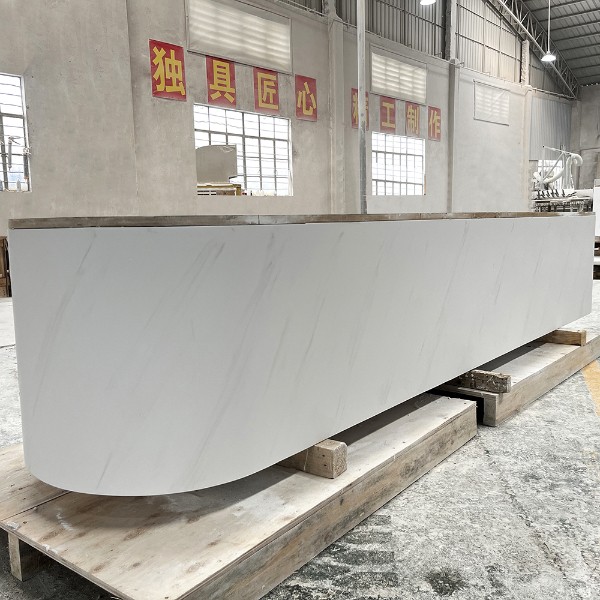
Solid Surface Slabs are engineered materials composed of acrylic resins and natural minerals, typically alumina trihydrate. The result is a non-porous, homogeneous material that mimics the appearance of natural stone while offering unique benefits. Unlike natural stone, Solid Surface slabs are consistent in color and pattern throughout their thickness, which allows for seamless installations and repairs.

Advantages of Solid Surface Slabs
1.Seamless Appearance: One of the key features of solid surface slabs is their ability to be joined seamlessly. This means there are no visible joints or grout lines, creating a sleek, continuous surface that is particularly desirable in modern design.
2.Durability and Strength: Solid surface slabs are highly durable and resistant to impact, scratches, and stains. Their non-porous nature makes them resistant to bacteria and mold growth, which is beneficial for both hygiene and longevity.
3.Ease of Maintenance: These slabs are easy to clean and maintain. Regular cleaning with mild soap and water is usually sufficient. For more stubborn stains, a gentle abrasive cleaner can be used without damaging the surface.
4.Customization: Solid surface slabs come in a wide variety of colors, patterns, and finishes. They can be easily cut and shaped to fit custom designs, making them suitable for everything from countertops to wall panels and sinks.
5.Repairability: Unlike natural stone, which may require professional repair for scratches or chips, solid surface slabs can be easily repaired with simple tools. Minor scratches or damages can be sanded out, and the surface can be restored to its original appearance.
6.Non-Toxic: The material is non-toxic and environmentally friendly, as it is often made from recycled materials and is fully recyclable at the end of its life.
Applications
1. Kitchen and Bathroom Countertops: Solid surface slabs are commonly used for countertops due to their seamless appearance and durability. They can be tailored to any kitchen or bathroom design, offering a sleek and modern look.
2. Sinks and Basins: These slabs can be molded into sinks and basins, providing a uniform look and eliminating the need for caulking around sink edges.
3. Wall Cladding: For a sophisticated and clean look, solid surface slabs are used for wall cladding in both residential and commercial settings.
4. Furniture and Fixtures: The versatility of solid surface slabs allows them to be used in custom furniture pieces, such as tables and reception desks, where both functionality and aesthetics are important.
Care and Maintenance
1. Regular Cleaning: Clean surfaces with a mild soap solution and a soft cloth. Avoid harsh chemicals and abrasive scrubbers that could damage the surface.
2. Stain Removal: For stubborn stains, use a non-abrasive cleaner and a soft sponge. For more severe staining, a mild abrasive cleaner can be used, but always test in an inconspicuous area first.
3. Repairing Damage: Light scratches can be sanded out with fine-grit sandpaper. For deeper scratches or chips, a solid surface repair kit can be used. Follow the manufacturer’s instructions for best results.
4. Avoid Heat and Chemicals: While solid surface slabs are heat resistant, it’s advisable to use trivets or heat pads to prevent damage from extremely hot items. Additionally, avoid placing highly acidic or alkaline substances directly on the surface for prolonged periods.
FAQ:
What is Solid Surface Slabs?
Solid Surface Slabs are engineered materials made from a blend of acrylic resins and natural minerals (such as bauxite) that have a non-porous, homogeneous structure that mimics the appearance of natural stone, but is often more durable and economical.
What are the key benefits of solid surface slabs?
Key benefits include a seamless appearance, durability, ease of maintenance, customizability, reparability, and non-toxic and environmentally friendly.
What applications can solid surface slabs be used for?
Common applications include kitchen and bathroom countertops, sinks, wall coverings, furniture and fixtures.
What is the best way to clean Solid Surface?
Use a mild soap solution and a soft cloth for cleaning, avoid using strong acids, alkalis or abrasive cleaners that may damage the surface.
What are the repair methods for solid surface slabs?
Minor scratches can be removed by sanding with fine sandpaper. For deeper scratches or cracks, they can be repaired with special patches.
Can Solid Surface Slabs be customized?
Yes, Solid Surface Slabs can be customized according to design needs, including colors, patterns and shapes, making them adaptable to various design styles.
What is the main difference between solid surface slabs and natural stone?
Solid Surface Slabs are man-made materials with homogeneous colors and textures that are easy to clean and maintain, whereas natural stone can have uneven colors and textures and requires more maintenance and upkeep.
Are solid surface slabs heat resistant?
While solid surface slabs are somewhat heat resistant, it is recommended that insulating mats be used to prevent direct contact with extremely hot items to avoid possible damage, and it is recommended that you use a heat shield to protect your solid surface slabs from the heat of the day.